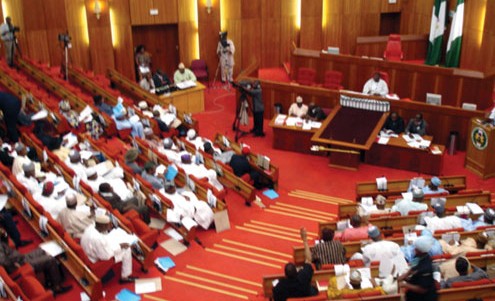
The Senate has urged President Bola Tinubu’s government to initiate measures to tackle the impending food insecurity in the country as a matter of urgency.
It also urged the government to outline measures to combat the situation and address Nigerians.
The Senate’s resolution followed the adoption of a motion on the urgent need to address food insecurity and market exploitation of consumables in Nigeria at plenary.
The motion was sponsored by Sunday Karimi (APC-Kogi) and Ali Ndume (APC-Borno).
Leading the debate, Mr Karimi said in the last few months, the price of goods and household consumables in Nigeria had been at an all-time high.
He said this was leading to a high rate of inflation, weakening purchasing power and affecting the living conditions of the vast majority of Nigerians.
He said the latest data by the National Bureau of Statistics (NBS) showed that food inflation in the country skyrocketed to 40.66 per cent on a year-on-year basis, representing a significant increase from the 24.82 per cent recorded in May 2023.
Mr Karimi said the current market price of food items such as beans, maize, rice paddy, yam, tomatoes, and onions, which initially rose by about 40 per cent after the removal of the petrol subsidy, had increased to between 100 per cent and 300 per cent with no attributable reason for the increase in prices.
He said insecurity in food-producing regions, bad roads, increase in the cost of transportation, and depreciation of the value of the naira had been identified as possible factors contributing to the increase in the prices of food items and other consumables.
He, however, said that a greater percentage of the increase in prices of food items and consumables was not only responsible for the factors but also the greed of merchants, traders, and retailers to make supernormal profits.
He said there were reports that the farming communities in the border regions with other countries preferred to sell their food items abroad to neighbouring countries, thus increasing local food insecurity. He expressed worry that efforts made by the government to arrest consistent increases in food inflation were yet to yield the desired results.
Mr Karimi said there was a need to be more pragmatic about addressing food insecurity, curbing herder-farmer crises, kidnapping for ransom, and terrorism. He said this would ensure the development of a viable national commodity board to regulate the price of grains.
He said efforts should be made to eliminate artificial contributions to food and commodity inflation in Nigeria.
Mr Ndume, who seconded the motion, said recent reports indicated that Nigeria might face food insecurity, adding that people were hungry as many farmers no longer had access to their farms because of insecurity. He said the lawmakers needed to take urgent steps as representatives of the people as food prices were on the high side.
In his contribution, Ahmad Lawan (APC-Yobe) lamented that Nigerians now struggle to have just a meal a day. According to him, the silos are empty, saying that the federal government would have to make frantic efforts to import food.
He said the national assembly must engage the executive to take immediate steps to avert food insecurity.
However, Ahmed Wadada (SDP-Nasarawa) commended the federal government for the recent decision to relax import duties and tax on food items to be imported into the country. He said the issue of food prices was serious, adding that Nigerians were patient people.
He urged lawmakers to do whatever was required at their various levels to add value to food production in the country.
Senate President Godswill Akpabio said the food issues increased when farmers were denied access to their farmlands due to bandits’ activities. He said the abandonment of farms by farmers due to insecurity had been a long-standing worrisome matter.
He urged the government to encourage farmers and farming activities, especially during this period.
Mr Akpabio said he was informed by the committee chairman on agriculture that the federal government had provided 60 trucks of fertilizer to each state.
According to him, Senators and House of Representatives members will receive between one and two trucks for onward distribution to their constituencies.
He said this was to ensure farming for improved production of food by Nigerians involved in agriculture.
He said efforts must be made to improve farming activities, while also commending the federal government for looking in the direction of tax duty exemption for imported food items into Nigeria.
